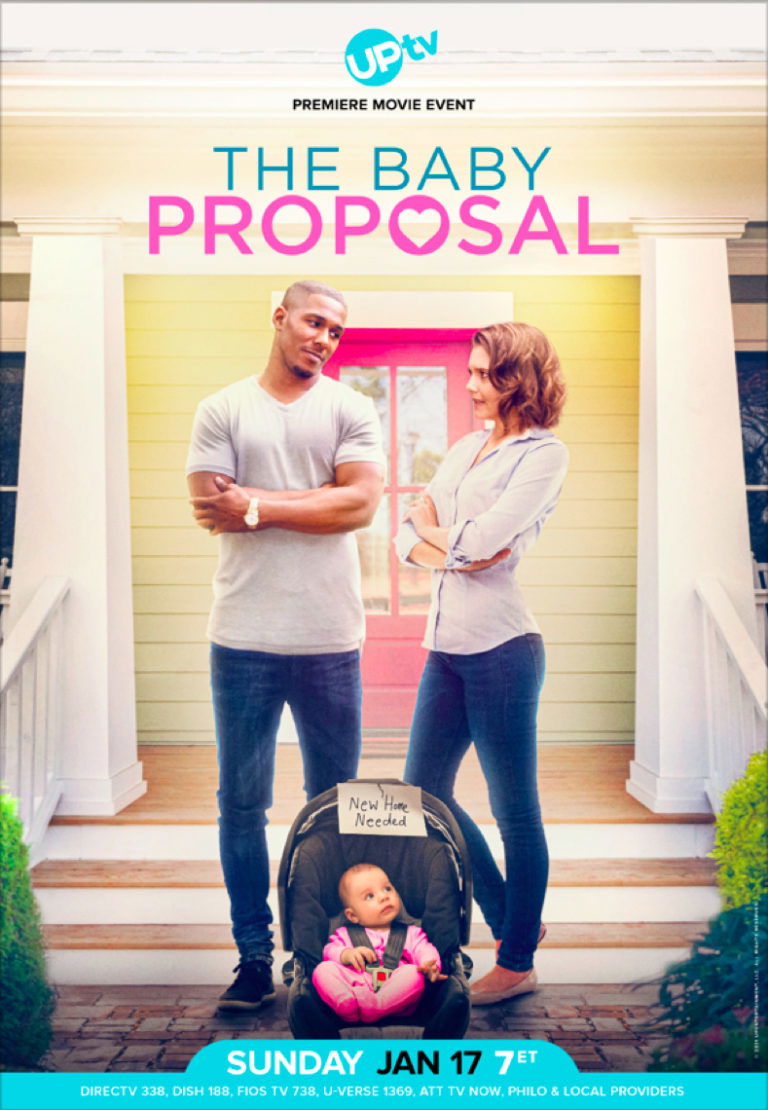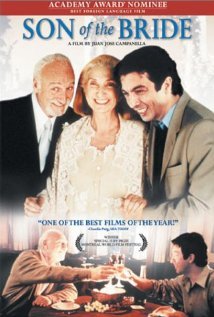“Maybe Zorro”

| None | Light | Moderate | Heavy | |
|---|---|---|---|---|
| Language | ||||
| Violence | ||||
| Sex | ||||
| Nudity |
What You Need To Know:
SON OF THE BRIDE is a heart-warming, well-made story that focuses on the love and compassion between friends and family. Rafael is transformed by the revelation that, instead of focusing on working to prove that he is somebody, joy and purpose are found in working to take care of those he loves. These positive qualities, however, are seen through the prism of a non-Christian, Romantic worldview, with humanistic elements. God is missing in this story, and the movie says that the church is a hindrance rather than a help. In contrast to this, the Bible tells us in Psalm 55:22, “Cast your cares on the Lord and He will sustain you.”
Content:
(RoRo, H, AB, C, BB, Cap, O, LL, V, SS, N, A, DD, M) Romantic worldview, with humanistic elements, basically says mankind’s love and care for one another gives life its meaning and hope; institutional church shown as not helpful, but there are several redemptive scenes of repentance, love and compassion and a positive view of marriage; some elements favoring free market capitalism; possible occult element where absent mother’s voice awakens man out of hospital sedation; one profanity, two curses, 21 sundry vulgarities and obscenities, man urinates in public on a tree then playfully tries to wet his friend to scare him (no nudity), and scene of old man on toilet talking on the phone; 14-year-old old boys beat up on younger boys, man punches then threatens life of a bill-collector, man tells of wife and daughter’s death in accident and says now they are his angels, man suffers mild heart attack, and emergency room scene as doctors work to revive heart attack victim; cohabitation implied, unmarried couple fool around on couch, man tells girlfriend, “Take me to bed,” and during the credits, two men watch a porno tape (the audience sees videotape’s semi-nude cover) and hear the sound of woman’s pleasured moaning while the men comment on the size of “actor’s” private part in comparison to their own (played for laughs); rear male nudity, women’s cleavage, woman wears long T-shirt as nightgown, showing her legs; alcohol use; smoking and man smokes marijuana in restaurant’s kitchen; and, church denies wedding to elderly couple, man says the church perpetuates the myth of love and then denies approval to divorce, live-in divorced couple argue around their daughter, and depressing scene in nursing home of forgotten elderly.
More Detail:
Rafael Belvedere dreamed of being Zorro since he was a child running around his mother’s feet. He thinks his mother (Norma Aleandro) hates him because he dropped out of law school then wandered aimlessly until he reached his latter twenties. Now, he is 42 and has spent half of his life trying to show his mother that he really is somebody – maybe Zorro.
Rafael went to work at his father’s ailing restaurant and made it a success. With responsibility, however, comes problems, along with their attendant stresses. Rafael responded to these challenges, as men tend to do, by focusing on solving the problems at the expense of his marriage and relationships with family and friends. Now that the restaurant is so successful that large corporations want to buy him out, his mother has Alzheimer’s disease and can neither stay focused, nor remember enough to appreciate all he’s done to prove himself. All Rafael wants to do is go, alone, to Mexico. He wants to escape life’s hassles; “just me and my soul,” he yearns.
Several events take place that cause Rafael to reassess his miserable life, including a mild heart attack. Another event is the reappearance of his old childhood friend, Juan Carlos (Eduardo Blanco), who, even after years of separation, is still just like family. Juan has a great attitude after losing his wife and daughter in a car accident. This baffles Rafael, as his own nerves are strained by work-related stress. Juan says that when he realized that nothing worse could happen to him than what already had happened, it gave him a sense of strength. He sticks by Rafael and helps him through his heart attack and rehabilitation as if they were brothers.
The primary event that influences Rafael’s life, which is also the movie’s most incredibly fulfilling subplot, its centerpiece really, is the ongoing love affair between Rafael’s elderly parents, Nino and Norma. His 80-something-year-old father decides he wants to remarry his wife in a religious ceremony. He explains that when they got married they both compromised to make their marriage work and to raise a family. He worked hard to give her all she ever wanted, except a church wedding ceremony; something she had always wanted. When Rafael protests that she won’t remember it because of her mental condition, Nino responds, “She’ll notice a bit…that’s enough for me.” This is a remarkable love story that happens to be a true slice-of-life from the director’s family – Nino and Norma represent his own parents. Nino proposes to Norma in a touching scene where she actually focuses a moment and recognizes, “my boyfriend!” in her husband’s time altered face. At one point, Rafael tells his girlfriend that he doesn’t want to marry her because, “love is kids stuff.” She snaps back, “What about your parents? That’s what I want.”
Rafael’s daughter plays the role of catalyst in his life. She is quite the grade-school poet. In one of her poems, that she has her father read out loud, she regards her father as not yet a man, due to his avoidance of commitment. Yet, she takes it all in stride because she loves both of her divorced parents very much and writes, “I’ll take care of my parents as long as my life lasts.”
“I’ll take care of you” becomes the recurring theme through the end of the movie as people either tell another person that they will take care of them, or proclaim their need to be taken care of themselves. The most poignant exchange happens as Rafael desperately tries to explain to his mother that he now really is somebody, and that he wishes she could only focus enough to confirm that. Eventually, during unrelated dialog, she caresses his face and tells him she loves him, and she says, “I will take care of you.” Rafael seems to be transformed by the revelation that instead of focusing on working to prove that he is somebody – like his childhood hero, Zorro – joy and purpose are found in working to take care of those he loves. From that point, he goes to each of his friends and family to apologize and make reconciliation.
SON OF THE BRIDE was produced in Argentina. There are several political allusions made throughout the movie to which I couldn’t relate. However, the filmmakers comment in the production notes that, while Rafael is trying to keep his restaurant afloat in the midst of Argentina’s social turmoil, “all the principal institutions which,” they feel, “should assist him – the Church, the banks, his suppliers, his government – all fail him.” They go on to say that the only hope they see is in “the love of the people and the sense of community.” In other words, if no one will do it for us, including God, we have to do it ourselves, but in reality that is the point the writers miss: God wants to live in and through us so that in our dependence upon Him, as the Church, we do, in fact, take care of each other.
Even though God is conspicuously absent from the movie, and the church is portrayed as both an unsympathetic and powerless business, the humanism at the core of the story should challenge the most ardent believer. In reality, God has chosen to dwell in temples made by His own hands: mankind’s hearts. “The Church” is made up of people who are God’s hands and feet in the earth. The church, as an institution, exists to equip congregations or parishioners – people – to do the work of ministry themselves . . . in this case, “Love your neighbor, as you love yourself,” or “take care of” one another.
If the filmmakers had understood, or experienced, this point, they might have written a powerful “Christian” story. Regrettably, they evidently have had little or no exposure to the power of the good news of Jesus Christ lived out by their own family and friends. Those of us fortunate enough to have experienced that in our lives will recognize that if the characters in the movie were portrayed as true believers, then the Church had indeed not failed them. The result is a powerful message with Christian form yet, ultimately, with neither honor for, nor the presence of, God.


 - Content:
- Content: 
